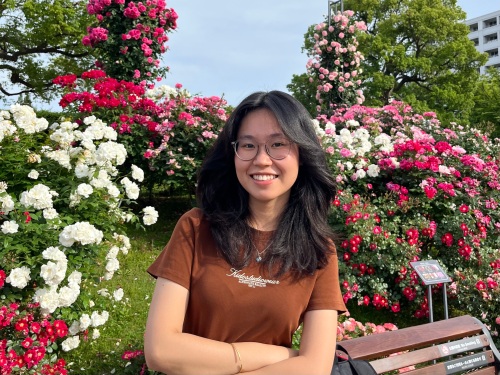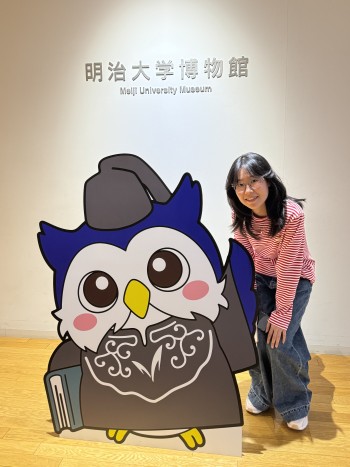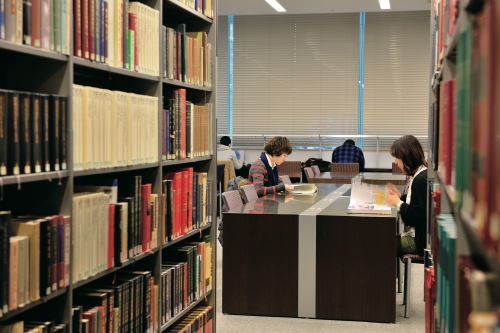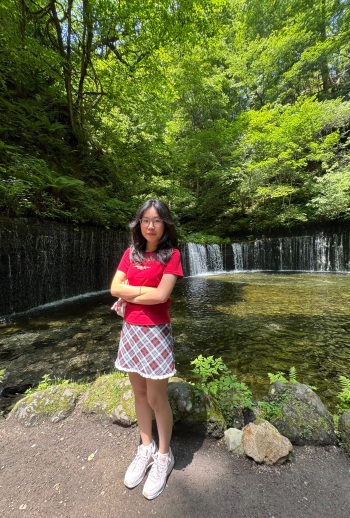2026年02月03日
「Meiji University is a great choice—don’t hesitate to come and create your own unique and exciting experiences here. 」(University of Economics Ho Chi Minh City、Ho Thao Nhiさん)
Profile of the exchange student
Name(氏名): Ho Thao Nhi
Home institution(所属大学): University of Economics Ho Chi Minh City (Vietnam)
Period of exchange program(留学期間): 2025/04~2025/09
What brought you to study abroad in Japan? Why did you choose Meiji University? / 日本への留学を志したきっかけと、明治大学を選んだ理由
What brought you to study abroad in Japan? /日本への留学を志したきっかけ
Since I was a child, I’ve been really interested in Japanese culture—especially the food, traditional clothing like kimono, the lifestyle, and all the cute little things unique to Japan. Around last year, I began studying Japanese as my third language. Coincidentally, my home university started offering exchange programs in several countries around the world. Among those options, I chose Japan without hesitation. I’ve always dreamed of experiencing daily life here, not just as a tourist but as a student who can immerse in the culture and language.
Why did you choose Meiji University? / 明治大学を選んだ理由
I chose Meiji University because of its long-standing history, prestigious reputation, and convenient location in the heart of Tokyo. I believed this environment will give me a great chance for me to improve my Japanese, gain new perspectives, and experience student life in the heart of Tokyo.
What do you like about Meiji University? / 明治大学の好きなところについて
(1) What is your favorite place on the campuses of Meiji University? / 明治大学のキャンパスで好きな場所はどこですか。
Meiji University has several campuses across Tokyo, each with its own unique charm. My main campus is Surugadai, and the place I visit most often is the Central Library in the Liberty Tower. My first impression was how spacious and well-equipped it is—it has four floors, each designed for different purposes such as reading rooms, multimedia areas, and group study spaces. The library also provides various facilities like computer terminals for book searches, a newspaper corner, and printing stations.
What I like most is the self-study and reading areas, which are quiet and very comfortable. Each desk has a privacy divider, reading lamp, and power outlets, creating a perfect environment for focusing on assignments after class.
Besides the library, I also enjoy spending time in the cafeteria inside Liberty Tower or going up to the top floor. From there, I can enjoy a beautiful view of the Chiyoda area of Tokyo—one of my favorite spots on campus.
What I like most is the self-study and reading areas, which are quiet and very comfortable. Each desk has a privacy divider, reading lamp, and power outlets, creating a perfect environment for focusing on assignments after class.
Besides the library, I also enjoy spending time in the cafeteria inside Liberty Tower or going up to the top floor. From there, I can enjoy a beautiful view of the Chiyoda area of Tokyo—one of my favorite spots on campus.
(2) What is your favorite subject (course) at Meiji University? / 好きな授業を教えてください。
Course title: Advanced Seminar (Lecturer: Prof. Unno)
My favourite course in my department is the Zemi (Advanced Seminar) of Intercultural Communication taught by Professor Unno Motoo. In this course, we don’t just learn theories—we also gain many interesting and valuable experiences. One thing I really enjoy is that we have discussion sessions in every class, which gives me the chance to make new friends from different countries, share ideas, hear diverse perspectives, and simply have fun and laugh together.
Our professor has organized a variety of engaging activities for us, such as giving presentations on different topics, role-playing as representatives of various countries to practice negotiation, and visiting the most famous and oldest temple in Tokyo—Sensoji Temple. One of the most memorable experiences was when our professor took us to watch a baseball match between Meiji and Waseda University.
In Vietnam, almost no one plays baseball, so it was actually the first time in my life seeing a baseball game. Even though I didn’t know the rules or much about the baseball, I was completely drawn in by the energetic atmosphere in the stadium—the passionate cheering from the crowd, the dedication of the cheerleading teams, and the respectful rituals everyone followed before and after the match. I was especially touched by how people enthusiastically supported the players under the summer sun. I felt deeply moved, excited, and grateful to be part of it. It was a truly unforgettable memory and one of the highlights of my time here.
Our professor has organized a variety of engaging activities for us, such as giving presentations on different topics, role-playing as representatives of various countries to practice negotiation, and visiting the most famous and oldest temple in Tokyo—Sensoji Temple. One of the most memorable experiences was when our professor took us to watch a baseball match between Meiji and Waseda University.
In Vietnam, almost no one plays baseball, so it was actually the first time in my life seeing a baseball game. Even though I didn’t know the rules or much about the baseball, I was completely drawn in by the energetic atmosphere in the stadium—the passionate cheering from the crowd, the dedication of the cheerleading teams, and the respectful rituals everyone followed before and after the match. I was especially touched by how people enthusiastically supported the players under the summer sun. I felt deeply moved, excited, and grateful to be part of it. It was a truly unforgettable memory and one of the highlights of my time here.
How is your life in Japan? / 日本で過ごした感想について
One of my strongest impressions of living in Japan is how much people here value personal space and quietness, especially in public places like on the train. Compared to where I live, this peaceful and calm atmosphere feels very refreshing, and I really enjoy it.
In Tokyo, almost everyone commutes by train, walks, or rides a bicycle. The number of people using bicycles and walking is especially impressive, and it's completely different from my home country, where most people rely on motorbikes or cars.
Another thing I love is how Japan embraces the changing seasons. Almost every month during my exchange period has its own signature flower. For example, March is known for sakura (cherry blossoms), April for tulips, May for roses, and June for hydrangeas (ajisai). I find it beautiful and meaningful that people look forward to seasonal flowers and even plan activities around them. It has helped me appreciate nature more deeply and enjoy the flow of time in a new way.
In Tokyo, almost everyone commutes by train, walks, or rides a bicycle. The number of people using bicycles and walking is especially impressive, and it's completely different from my home country, where most people rely on motorbikes or cars.
Another thing I love is how Japan embraces the changing seasons. Almost every month during my exchange period has its own signature flower. For example, March is known for sakura (cherry blossoms), April for tulips, May for roses, and June for hydrangeas (ajisai). I find it beautiful and meaningful that people look forward to seasonal flowers and even plan activities around them. It has helped me appreciate nature more deeply and enjoy the flow of time in a new way.
(1) What made you surprised during the study abroad in Japan? / 日本に留学して驚いたところは?
I was really impressed and surprised by how large and complex the train system is in Japan, especially in Tokyo. You can commute almost anywhere by train, and at first, I thought it was all operated by one company. But it turns out that many different companies run the train lines—such as JR, Keio, Odakyu, Toei, and more—yet they are all well connected and coordinated. It’s very convenient once you get used to it, but it can be a bit overwhelming at first!
Another thing I noticed is that paper is still widely used in Japan. From important documents and announcements to advertisements and flyers, printed materials are everywhere. Most of them are thoughtfully designed and visually appealing, which shows the attention to detail and care that people here put into presentation.
Another thing I noticed is that paper is still widely used in Japan. From important documents and announcements to advertisements and flyers, printed materials are everywhere. Most of them are thoughtfully designed and visually appealing, which shows the attention to detail and care that people here put into presentation.
(2) Comparing with your student life in/at your home country/institution, do you find anything that you particularly enjoy as well as anything challenging for you in your student life here in Japan? / 自分の国の学生生活と比べて、日本の学生生活で楽しいところ・大変だと感じるところはありますか?
■Things you particulartly enjoy / 楽しいところ
Thanks to the exchange program, I had the opportunity to meet many international friends and create lots of fun memories with them. I also got the chance to meet and talk with Japanese students, which helped me gain a deeper and more authentic perspective on Japan by learning directly from the locals.
Another highlight was being able to take Japanese language courses that I truly enjoyed. The teachers were very kind and supportive, and I learned a lot from them. These classes are something I wouldn’t have had access to if I weren’t part of the exchange program. Through them, I was able to improve my Japanese skills, learn more about Japanese culture, and take part in many interesting cultural activities that made my experience even more meaningful.
■Things challenging for you / 大変なところ
From my personal experience, commuting in Japan is very different from what I'm used to in Vietnam. Back home, my house is only about 2 kilometers from my school, and since motorbikes are the main mode of transportation, it usually takes me only 5 to 10 minutes to get there.
However, in Japan, it seems completely normal for people—especially students—to spend around an hour commuting to school by train. What surprised me even more is how crowded the trains are during rush hours. The morning trains are often packed with people, and I still find it a bit hard to get used to standing in such a tight space every day.
Thanks to the exchange program, I had the opportunity to meet many international friends and create lots of fun memories with them. I also got the chance to meet and talk with Japanese students, which helped me gain a deeper and more authentic perspective on Japan by learning directly from the locals.
Another highlight was being able to take Japanese language courses that I truly enjoyed. The teachers were very kind and supportive, and I learned a lot from them. These classes are something I wouldn’t have had access to if I weren’t part of the exchange program. Through them, I was able to improve my Japanese skills, learn more about Japanese culture, and take part in many interesting cultural activities that made my experience even more meaningful.
■Things challenging for you / 大変なところ
From my personal experience, commuting in Japan is very different from what I'm used to in Vietnam. Back home, my house is only about 2 kilometers from my school, and since motorbikes are the main mode of transportation, it usually takes me only 5 to 10 minutes to get there.
However, in Japan, it seems completely normal for people—especially students—to spend around an hour commuting to school by train. What surprised me even more is how crowded the trains are during rush hours. The morning trains are often packed with people, and I still find it a bit hard to get used to standing in such a tight space every day.
About yourself and messages / ご自身について&メッセージ
(1) What is your dream? / 将来の夢は何ですか?
My short-term goal is to return to my home university and complete my bachelor's degree. I also plan to continue studying and improving my Japanese, and take the Japanese Language Proficiency Test (JLPT) to increase my chances of getting better job opportunities in the future.
In addition, I want to learn more about logistics, as it is a field I’m very interested in. If possible, I hope to have the chance to come back to Japan—either to travel, work, pursue higher education, or even live here someday.
In addition, I want to learn more about logistics, as it is a field I’m very interested in. If possible, I hope to have the chance to come back to Japan—either to travel, work, pursue higher education, or even live here someday.
(2) Please introduce something about your home country and university./ 故郷の国や大学の紹介や自慢をしてください。
My home university (University of Economics Ho Chi Minh City) is a well-established and reputable institution, especially known for its strong training programs in economics and business—not only in the south of Vietnam, but also across the entire country.
In recent years, the university has been expanding and offering more diverse majors for students to choose from. It is no longer limited to economics, business, or political science, but also includes fields like engineering and technology. Alongside that, the university continues to improve its facilities, providing students with a better learning environment compared to many other universities.
The lecturers and professors are experienced and highly qualified. The university also has strong partnerships and collaborations with various companies and organizations, creating more opportunities for students to connect with the real business world.
In particular, at ISB (International School of Business), where I am currently studying, we are equipped with practical knowledge and take part in activities that prepare us for our future careers. All classes are taught 100% in English, which helps us build skills needed to work in international or multinational companies.
In recent years, the university has been expanding and offering more diverse majors for students to choose from. It is no longer limited to economics, business, or political science, but also includes fields like engineering and technology. Alongside that, the university continues to improve its facilities, providing students with a better learning environment compared to many other universities.
The lecturers and professors are experienced and highly qualified. The university also has strong partnerships and collaborations with various companies and organizations, creating more opportunities for students to connect with the real business world.
In particular, at ISB (International School of Business), where I am currently studying, we are equipped with practical knowledge and take part in activities that prepare us for our future careers. All classes are taught 100% in English, which helps us build skills needed to work in international or multinational companies.
(3) Please give some messages for international students who wish to come and study at Meiji University as an exchange student. / これから明治大学に留学することを志している方へのメッセージをお願いします。
Meiji University is a great choice—don’t hesitate to come and create your own unique and exciting experiences here. You’ll also get to enjoy the vibrant atmosphere of Tokyo and immerse yourself in Japanese culture.
(4) Please give some messages for Meiji University students / 明大生へのメッセージをお願いします。
I would like to thank everyone who has helped and supported me during my time here. I truly feel grateful for the friends I’ve made and for all the volunteers who organized activities and were always willing to help us. Their kindness and support made my exchange experience much more meaningful and memorable.














